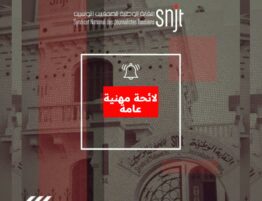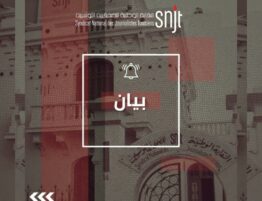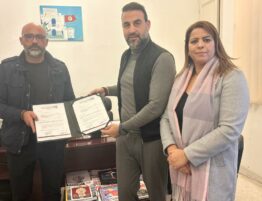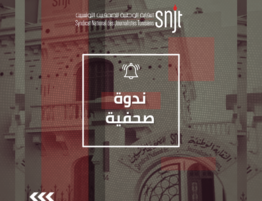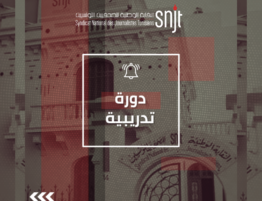
تدعو المنظمات الموقعة أدناه السلطات الجزائرية الى وضع حد لتكاثر الإعتدات على الصحفيين ووسائل الإعلام الناقدة و جعل التشريعات الخاصة بوسائل الإعلام تتماشى مع إلتزامات الجزائر الدولية في مجال حقوق الإنسان ومع الضمانات التي يكفلها الدستور٠
اشتدت الهجمات على الصحافيين المستقلين والمدافعين عن حقق الإنسان على مدى الأشهر الماضية في الجزائر، حيث شملت إعتقال إثنين من كبار الموظفين في قناة تلفزيونية خاصة٠
في ٢٤ يونيو/حزيران تم إيقاف مهدي بن عيسى، مدير محطة تلفزيون مجمع “الخبر” الإعلامي (كا بي سي) و زميله رياض حتروف٠
و يعتقد أن هذه الإعتقالات لها علاقة ببث برنامجين ساخرين ،”كي حنا كي الناس” و “ناس السطح”، تناولا قضايا سياسية، إقتصادية و اجتماعية، بما في ذلك مزاعم فساد ضد الرئيس الجزائري عبد العزيز بوتفليقة الماسكة بزمام السلطة لمدة طويلة، ومسؤولين آخرين في الحكومة.
بن عيسى و حتروف متهمان، وحسب تصريحات محاميهما، بالتواطئ في سوء إستخدام النفوذ وتزوير التصاريح حسب المادة ٢٢٣ من قانون العقوبات الجزائري٠ و في حال إدانتهما سيواجهان أحكاما قد تصل عشرة سنوات سجنا بالنسبة إلى التهمة الأولى و ثلاثة سنوات بالنسبة إلى التهمة الثانية، حسب التقارير المتوفرة٠
مونيا نجاعي، موظفة بوزارة الثقافة و مسؤولة عن منح التراخيص، تم هي الأخرى إيقافها بتهمة إساءة إستعمال السلطة بموجب المادتين ٣٣ و ٤٢ من القانون ٠٦ ــ ٠١ الخاص بالفساد و الذي يقضي بأحكام تصل إلى ١٠ سنوات سجنا٠
وتأتي هذه الاعتقالات بعد تنصيب أعضاء الهيئة الجديدة لتعديل البث السمعي البصري، من قبل رئيس الوزراء عبد المالك سلاّل في شهر يونيو/ حزيران، و المنبثقة عن قانون ٢٠١٤ الخاص بالأنشطة السمعية البصرية الذي سلّط، و بدون موجب، على وسائل الإعلام السمعية البصرية في البلاد شروط تسجيل مقيدة لحرية البث الاذاعي والتلفزي.
قامت السلطات الأمنية بغلق الستوديو حيث تم تصوير “كي حنا كي الناس” يوم ١٩ يونيو / حزيران و علّلت السلطات هذا الغلق بأن الستوديو كان مستخدما من قبل قناة تلفزية مغلقة “أطلس تي في”. علما أن قناة “أطلس تي في” قد أغلقتها الحكومة إثر مداهمة في سنة ٢٠١٤ ٠ كما تم غلق قناة أخرى، “الوطن تي في” خلال سنة ٢٠١٥ـ
صادقت الجزائر على العهد الدولي الخاص بالحقوق المدنية والسياسية في عام ١٩٨٩، و على الميثاق الإفريقي لحقوق الإنسان والشعوب في عام ١٩٨٧. كما أن التعديل الدستوري الجزائري لسنة ٢٠١٦ يضمن حرية الإعلام، دون رقابة٠ مسبقة
تنتمي قناة “كا بي سي” إلى مجمع لخبرالإعلامي”، الذي ينشر صحيفة يومية تحمل نفس الإسم٠
عارضت الحكومة الجزائرية مؤخرا بيع “مجمع الخبر الإعلامي” إلى يسعد ربراب صاحب صحيفة “الحرية” الناطقة بالفرنسية وأغنى رجل أعمال في الجزائر، حسب تقارير صحفية، بتعلة تطبيق قانون مكافحة الاحتكار، وذلك من أجل لإفساد عملية البيع ٠ أما حسب ما صرح به محامي ربراب وذكرته منظمات محلية و دولية، فقد كان لقرار الحكومة “دوافع سياسية”.
أظهرت الأبحاث والتقصيات التي قامت بها منظمة مراسلون بلا حدود و التي أتاحتها للعموم في شهرمايو ٢.١٦ أن أربعة فقط من أصل 58 قنوات تلفزية خاصة تعمل في الجزائر “لديها في الواقع الإذن للقيام بذلك.” هذه القنوات الأربع هي، “دزاير تي في”، “النهار تي في”، “الجزائر تي في” و “الشروق تي في”، “كلها معروفة بعدم نقدها للحكومة.
وفي هذا السياق، منعت قوات الأمن صحيفة “الوطن” المستقلة من الانتقال إلى مكاتبها الجديدة في الجزائر العاصمة يوم 23 يونيو، قائلة انها تفتقر الى “رخصة عمل”. بينما يعتبر صحفيو “الوطن” أن هذا التدخل الأمني جزء من الثمن الباهظ الذي يدفعونه دفاعا على الصحافة الناقدةـ
تؤكد المنظمات الموقعة ادناه تضامنها مع جميع الصحفيين المستقلين والعاملين في وسائل الإعلام المستهدفة بسبب أدائها لعملها في المنطقة العربية، وتحث السلطات الجزائرية على::
ـ الإفراج بدون أي شرط عن مهدي بن عيسى، رياض حتروف ومونيا نجاعي ، وإرجاع معدات الإنتاج إلى “كا بي سي” حتى تستأنف عملها بالكامل؛
ـ انهاء اللجوء إلى الإجرا ء ا ت الإدارية التعسفية لحظر وتجريم حرية التعبير والصحافة المستقلة.
ـ تعديل جميع التشريعات المستخدمة في تجريم الإعلامين بسبب قيامهم بعملهم، والتي لا تتماشى مع الدستور المنقح في بداية السنة الجارية، والقانون الدولي لحقوق الإنسان، ولا سيما المادة 19 من العهد الدولي الخاص بالحقوق المدنية والسياسية.
موقعة من قبل
النقابة الوطنية للصحفيين التونسيين
الشبكة العربية لمعلومات حقوق الإنسان
منظمة المادة 19
لجنة حماية الصحفيين
الجنة من أجل احترام الحريات وحقوق الانسان في تونس
الشبكة الأوروبية المتوسطية لحقوق الإنسان
الحرية الآن، المغرب
منظمة “فري براس أنلميتد” (صحافة حرة بلا حدود)
منظمة “فرونت لاين ديفندرز (مدافعو الخط الامامي)
دعم الإعلام الدولي
المعهد الدولي للصحافة
ليبيا المستقبل، مركز الإعلام والثقافة
الجمعية التونسية للنساء الديمقراطيات
نواة، تونس
الجمعية التونسية للدفاع عن القيم الجامعية
مركز تونس لحرية الصحافة
المنتدى التونسي للحقوق الاقتصادية والاجتماعية
الرابطة التونسية للدفاع عن حقوق الإنسان
يقظة من أجل الديمقراطية والدولة المدنية، تونس
الرابطة العالمية للصحف وناشري الأنباء
جمعية عائلات المختفين في الجزائر
الرابطة الجزائرية للدفاع عن حقوق الإنسان
Free Expression Groups Alarmed by Attacks on Independent Media in Algeria
The undersigned organisations urge the Algerian authorities to put a stop to rising attacks on critical journalists and media outlets and bring media legislation in line with Algeria’s international human rights obligations and constitutional guarantees.
Attacks on independent journalists and human rights defenders have intensified over the past months in Algeria.This includes the arrest of two senior staff at a privately owned TV channel.
Mehdi Benaissa, Director ofthe television station Khabar Broadcasting Corporation (KBC) and his colleague RyadHartouf were arrested on 24 June.
The arrests are believed to be related to the broadcasting of two satirical TV shows Ki Hna Ki NassNass(“We are like anyone else”) and Ness Estah(“People of the roof”). The shows deal with political, economic, and social issues, including allegations of corruption against long-time president AbdelazizBouteflika and other government officials.
Benaissa and Hartoufare charged with complicity in the abuse of position and falsifying permits under Article 223 of the Algerian Penal Code, Benaissa’s lawyer told reporters. If convicted, Benaissa and Hartouf face sentences of up to 10 years in prison on the first charge, and up to three years on the second, according to reports.
MouniaNedjai, an officer at the Ministry of Culture in charge of licensing, was also arrested, charged with abuse of position under Articles 33 and 42 of Law 06-01 on Corruption, which carry up to 10 years in prison.
The arrests follow the June inaugurationof the new regulatory body, the Audiovisual Broadcasting Authority, set up in accordance with the restrictive 2014 Law on AudiovisualActivity, which has imposed unduly restrictive registration requirements on audio-visual media in the country.
Security forces closed the studio where Ki KiHnaNasswas filmed on 19 June, with authorities saying the closure was because the studio had been used by the shuttered station Atlas TV, according to reports. Atlas TV was shut down by the government after a police raid in 2014, according to reports. Another channel, Al Watan TV, was also closed down in 2015.
Algeria ratified the International Covenant on Civil and Political Rights in 1989 and the African Charter on Human and People’s Rights in 1987. The country’s 2016 constitutional revision guarantees media freedom, without censorship.
KBC belongs to the El Khabar media group, which publishes adaily newspaper of the same name.
The Algerian government recently opposed the sale of El Khabar media group to IssadRebrab, whoowns the daily newspaper Liberté and is reported to be the wealthiest businessman in Algeria. The government invoked an anti-monopoly law to prevent thesale, withRebrab’s lawyers and local and international groups calling the government decision “politically motivated.”
Research by the Paris-based press freedom group Reporters without Borders (RSF) made public in May showed that only four out of 58 private TV channels operating in Algeria “actually have permission to do so.” The research found that those four channels, Dzair TV, Ennahar TV, El Djazair and Echourouk TV, “are all known for not being very critical of the government.”
In another move, security forces prevented the daily El Watan from moving to its new offices in Algiers on 23 June, saying they lackedan “operating certificate.”El Watan journalists say they see this move as part of the high price they pay for their critical journalism.
The undersigned organisations reiterate their solidarity with all independent journalists and media workers targeted for their work in the Arab region and urge the Algerian authorities to:
– Unconditionally release MehdiBenaissa, RyadHartouf and MouniaNedjai, and to return to KBC its production equipment so it can resume operating fully;
– Stop resorting to abusive administrative procedures toban and criminalise freedom of expression and independent journalism;
– Amend all legislation used to jail media workers for doing their job and which is not in line with the revised Constitution or international human rights law, in particular Article 19 of the International Covenant on Civil and Political Rights.
Signed by:
Algerian League for the Defense of Human Rights (LADDH)
Arabic Network for Human Rights Information (ANHRI)
ARTICLE 19
Committee for the Respect of Liberties and Human Rights in Tunisia (CRLDHT)
Committee to Protect Journalists (CPJ)
EuroMed Rights
Freedom Now, Morocco
Free Press Unlimited
Front Line Defenders
Group for the Families of the Disappeared in Algeria (CFDA)
International Media Support (IMS)
International Press Institute (IPI)
Libya Al-Mostakbal Centre for Media & Culture
National Syndicate of Tunisian Journalists (SNJT), Tunisia
Nawaat, Tunisia
Tunisian Association for the Defense of Academic Values (ATDVU)
Tunisian Association of Democratic Women (ATFD)
Tunis Centre for Press Freedom, Tunisia
Tunisian Forum for Economic and Social Rights (FTDES)
Tunisian League for Human Rights (LTDH)
Vigilance for Democracy and the Civic State, Tunisia
World Association of Newspapers and News Publishers (WAN-IFRA)
Des groupes de défense de la liberté d’expression vivement préoccupés par les attaques perpétrées à l’encontre des médias indépendants en Algérie
Les organisations signataires exhortent les autorités algériennes à mettre un terme aux attaques de plus en plus fréquentes à l’encontre de journalistes et de médias critiques et à aligner la législation relative aux médias sur les garanties constitutionnelles et les obligations internationales de l’Algérie en matière de droits humains.
Les attaques que subissent les journalistes indépendants et les défenseurs des droits humains se sont multipliées en Algérie au cours des derniers mois. Deux cadres supérieurs d’une chaîne de télévision privée ont notamment été arrêtés.
Mehdi Benaïssa, directeur de la chaîne de télévision Khabar Broadcasting Corporation (KBC), et son collègue Ryad Hartouf ont été appréhendés le 24 juin.
Ces arrestations seraient liées à la diffusion de deux émissions satiriques, Ki Hna Ki Nass Nass (« Nous sommes comme tout le monde ») et Ness Estah (« Les gens du toit »). Ces deux émissions traitent de questions politiques, économiques et sociales, y compris des allégations de corruption qui pèsent contre le président de longue date, Abdelaziz Bouteflika, et d’autres représentants du gouvernement.
D’après l’avocat de Mehdi Benaïssa, les deux hommes sont accusés d’être complices d’abus de fonction et d’avoir falsifié des autorisations en vertu de l’article 223 du Code pénal algérien. Selon certaines informations, s’ils sont condamnés, Mehdi Benaïssa et Ryad Hartouff risquent jusqu’à dix ans de prison pour le premier chef d’accusation et jusqu’à trois ans de prison pour le second chef d’accusation.
Mounia Nedjaï, une fonctionnaire du ministère de la Culture chargée de délivrer des autorisations, a également été arrêtée et accusée d’abus de fonction en vertu des articles 33 et 42 de la loi 06-01 relative à la lutte contre la corruption. Elle risque jusqu’à dix ans de prison.
Ces arrestations font suite à l’inauguration en juin du nouvel organisme de réglementation, l’Autorité de régulation de l’audiovisuel, institué conformément à la loi restrictive de 2014 relative à l’activité audiovisuelle. Cette loi a imposé des exigences d’enregistrement excessivement restrictives aux médias audiovisuels du pays.
Selon certains renseignements, les forces de sécurité ont fermé le studio d’enregistrement de l’émission Ki Ki Hna Nass le 19 juin, au motif qu’il avait été utilisé par la chaîne Al Atlas TV interdite de diffusion. Al Atlas TV a été fermée par le gouvernement après une descente de police en 2014. Une autre chaîne de télévision, Al Watan TV, a également dû cesser ses activités en 2015.
L’Algérie a ratifié le Pacte international relatif aux droits civils et politiques en 1989 et la Charte africaine des droits de l’Homme et des peuples en 1987. La révision constitutionnelle algérienne de 2016 garantit la liberté des médias, sans aucune censure.
KBC appartient au groupe médiatique El Khabar, qui publie un quotidien du même nom.
Le gouvernement algérien s’est récemment opposé à la vente du groupe médiatique El Khabar à Issad Rebrab, qui possède le quotidien Liberté et qui serait l’homme d’affaires le plus riche d’Algérie. Le gouvernement a invoqué une loi antimonopole pour empêcher la vente. Les avocats d’Issad Rebrab et les groupes locaux et internationaux ont déclaré que la décision du gouvernement était « fondée sur des raisons politiques ».
L’étude réalisée par l’ONG française pour la liberté de la presse « Reporters sans frontières » (RSF) et rendue publique en mai indique que seulement 4 des 58 chaînes de télévision privées en Algérie « ont effectivement l’autorisation de diffuser leurs émissions ». Selon cette étude, ces quatre chaînes, à savoir Dzair TV, Ennahar TV, El Djazair et Echourouk TV, « ont toutes la réputation de ne pas se montrer très critiques à l’égard du gouvernement ».
De même, les forces de sécurité ont empêché le journal El Watan de s’installer dans ses nouveaux locaux à Alger le 23 juin, au motif que le bâtiment ne possédait pas de « certificat d’exploitation ». Les journalistes d’El Watan ont déclaré que cette mesure faisait partie du prix à payer pour exercer leur journalisme critique.
Les organisations signataires réitèrent leur solidarité avec tous les journalistes indépendants et le personnel des médias visés en raison de leur travail dans la région arabe et appellent les autorités algériennes à :
– libérer sans condition Mehdi Benaïssa, Ryad Hartouf et Mounia Nedjaï, et restituer à KBC son matériel de production afin qu’elle puisse reprendre complètement ses activités ;
– cesser de recourir à des procédures administratives abusives pour interdire et criminaliser la liberté d’expression et le journalisme indépendant ;
– modifier toutes les lois qui ont permis d’emprisonner des journalistes pour avoir fait leur travail et qui ne sont pas conformes à la Constitution révisée et au droit international des droits de l’Homme, en particulier l’article 19 du Pacte international relatif aux droits civils et politiques.
Signé par :
Réseau arabe pour l’information sur les droits de l’Homme (ANHRI)
ARTICLE 19
Association tunisienne de défense des valeurs universitaires (ATDVU)
Association tunisienne des femmes démocrates (ATFD)
Centre de Tunis pour la liberté de la presse, Tunisie
Centre Libya Al-Mostakbal pour les médias et la culture
Collectif des familles de disparu(e)s en Algérie (CFDA)
Comité pour la protection des journalistes (CPJ)
Comité pour le respect des libertés et des droits de l’Homme en Tunisie (CRLDHT)
EuroMed Droits
Forum tunisien pour les droits économiques et sociaux (FTDES)
Freedom Now, Maroc
Free Press Unlimited
Front Line Defenders
International Media Support (IMS)
International Press Institute (IPI)
Ligue Algérienne pour la Défense des Droits de l’Homme (LADDH)
Ligue tunisienne pour la défense des droits de l’Homme (LTDH)
Nawaat, Tunisie
Syndicat national des journalistes tunisiens (SNJT), Tunisie
Vigilance pour la démocratie et l’État civique, Tunisie
Association mondiale des journaux et des éditeurs de médias d’information (WAN-IFRA)

